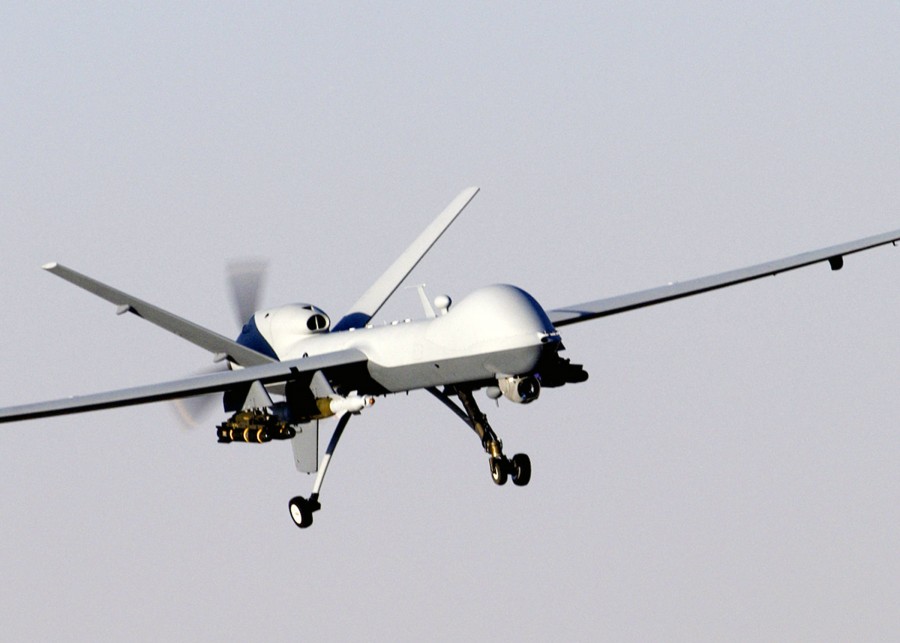The Morality of Drone Warfare
A UAV drone. Photo via Wikimedia Commons under the Creative Commons license. https://upload.wikimedia.org/wikipedia/commons/b/b0/MQ-9_Reaper_in_flight_(2007).jpg
The world in which we live is on the verge of being dominated by technology that was once the stuff of science fiction. With that, a key question arises: is using automated war machines ethical? The technology involved in drones has improved by leaps and bounds over the past few years, most notably seen in how Amazon has unveiled plans to deliver packages by automated drones. The military already uses Unmanned Aerial Vehicles (UAVs) to deliver air strikes to enemies. While this seems to be the direction that warfare is headed, some people are questioning its morality.
UAVs have been in operation for a long time now, with the first electronic ones being utilized in the early 20th century as target practice for combat pilots. Drones were then transformed into machines for reconnaissance starting in the 1960’s. The Predator Drone, the drone used by the United States military today, was first flown in 1994. This drone is equipped with a laser targeting system that are capable of eliminating targets on the ground in a split second. To date, 3,989 people have been killed in 421 strikes in Pakistan alone.
As the drone technology advances, some people believe that the unmanned drones will soon replace the need for human pilots in battle. When asked about the possibility of humans no longer being needed to fly planes in battle, Air Force Academy Cadet Brett Dadiego stated, “There’s certainly a time and place where drones are the best option; but there’s a certain factor that human pilots bring to the table. I believe that there will always be a place for human pilots.”
While it is clear that drones can have a large impact on the battlefield and perform the tasks for which they are programmed, we must ask ourselves this: is the use of robots to kill humans moral? There are certainly many factors to consider when debating this question. First, one must consider that drones fire explosives, and that means that there is no way to guarantee that innocent civilians would not be hurt, or even killed. While drones are capable of eliminating positions as a whole, it is difficult for them to eliminate only the intended target. Over the past 10 years in Pakistan, Yemen, and Somalia, 1,280 civilians have been killed in drone strikes. With that being said, UAV strikes save the lives of countless American soldiers, whether they provide support for soldiers on the ground, or keeping pilots out of harm’s way.
One overlooked problem, however, is that the drones are controlled remotely from locations within our own nation, in places like Nevada and New Mexico. This means that someone who is operating these drones could execute an airstrike and potentially kill someone, then go home to their family after a day of work. While there have been no studies of the psychological affects on the drone pilots specifically, it is very possible that flying these missions can affects humans. As we go forward into the future of military drones, we must make sure that we responsibly utilize this new technology.

Hello fellow homosapiens. My name is Nate Renfrew, I am a senior at Air Academy, and I am the Junior Sports Editor for the Jetstream Journal. Besides being...














Pam Lively • Feb 5, 2016 at 1:17 pm
I’m intrigued by the use of technology as a whole & wonder whether nations are also criticized for satellite reconnaissance or missile defense systems, for example, both of which are operated remotely. There might be an interesting comparison there.
I agree w/ Jake . . . “quite thought provoking.”
Affect is a verb; effect is a noun: “psychological affects” s/b “psychological effects.”
Jacob Wilkes • Feb 4, 2016 at 1:30 pm
Quite thought provoking.
Audrey Levens • Jan 15, 2016 at 9:58 am
Wow very interesting.